Rafael Bernabe
October 5, 2017
(Normally my writing, especially when facing new situations,is the result of discussions with my comrades. But these days we are practically incommunicado. That’s why even more than in other cases, this article is entirely my responsibility. And, at the same time, I write with incomplete information, the result of the same lack of communication, and therefore everything that I write is, even more than usual, subject to future correction.)
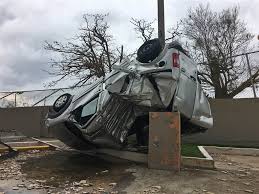
Crises raise new, sharp problems that unveil and accentuate both the admirable and the negative aspects of the societies they affect. They also pose new tasks and offer new perspectives on already established plans. The case of Puerto Rico and the effect and response to the strike by Hurricane María is no exception.
We begin with the admirable: the presence of solidarity, of community, and of generosity that continues to exist in our country in spite of three decades of neoliberal practices and depredations that served private interests over public interests, put competition above collaboration, egoism above community, immediate gains above long-term considerations, and fragmentation above democratic integration.
I could give dozens of examples: the ride they’ve given me when walking to some event (because of lack of gasoline), the food they’ve given me on trust (because I had no cash), the coffee offered by my neighbors, the use of a hotplate loaned to me to warm food so I could give my baby something to eat, the doctors and other health personnel working in a hospital that had been left without electricity (when we had to go to the emergency room the day after the hurricane).
There is no doubt that our people understand and feel, despite everything, that human relationships, even with unknown people, are more valuable and should be more valuable than the cold connection of cash.
But there are problems and challenges which demand reflection: we cannot leave to one side the most urgent tasks, but neither can we fail to analyze the situation, above all if from the beginning we want to reconstruct a Puerto Rico which is different and better. That reconstruction has begun and we cannot leave reflection for later.
To begin with the most immediate issue. There is no doubt that the preparations for response to the disaster were inadequate. We can’t ask for miracles. But without a doubt, it was necessary to have a plan or plans to maintain the water supply, food, health services and the provision of fuel necessary for all of this, being aware of a predictable and anticipated collapse of the electric system. Was such a plan and foresight possible?
Without a doubt, at least to a greater degree than we have been able to observe. The reality is that we had already had the experiences of hurricanes Andrew and Katrina, experiences that were not adequately taken advantage of. (We will return to the roots of this lack of foresight.) But it is certain that the plans, as good as they may have been, could not solve everything. There are other problems certainly that also had to be attended to, but those are not emergency plans. For example: gasoline and health.
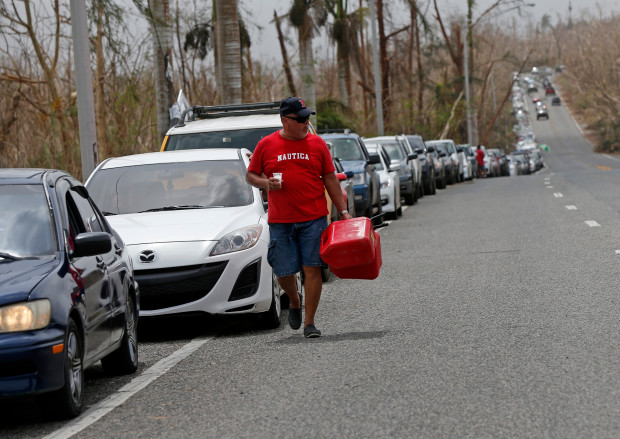
The desperate search for gasoline, with the chaos and uncertainty that we have lived through, is the result, in the last analysis, of our nearly absolute dependence on the private automobile as our means of transport, which has so often been criticized for environmental and urban planning reasons.
Readers should think how different our situation in which we found ourselves would have been with a dense and efficient network of mass transportation; constructing such a system would be a difficult task, but without a doubt it would permit and guarantee the re-establishment of access and of movement to people much more rapidly than trying to provide gasoline to millions (yes, millions) of automobiles.
That is, the hurricane’s strike accentuated the necessity that had already been proposed before the hurricane. Let’s not forget this as we reconstruct. (Ironically, one of the reasons that mass transportation had been and continues to be suggested is because of the necessity of reducing the burning of gasoline in order to deal with the threat of climate change, one of the effects of which is precisely an increase in the frequency of extreme events such as a Category 5 hurricane.)
Another example is our health care system. I shouldn’t say a system. We had a system until the decade of the 1990s. It was a logically designed system, with diagnostic and treatment centers and primary, secondary and tertiary care facilities in a kind of pyramid. It had its weaknesses and should have been improved, but it was a minimally coherent system. In a crisis such as this, it could prepare, engage and coordinate, once again with basic coherence and efficiency throughout the country.
But that system no longer exists; what exists now is the fragmented, chaotic and dis-articulated result of privatization. The task of preparing for and responding to the crisis is therefore much more difficult. (One of the more unfortunate experiences has been a pharmacy which refused to fulfill an existing prescription for my baby because the system was down and for that reason they couldn’t bill my health care plan.)
The lack of foresight and the inadequacy of the initial response also falls on FEMA (the Federal Emergency Management Agency). Since Katrina, the inadequacy of this agency has been demonstrated; it is an apparatus that functions, if not with the logic of business as usual, with that of disaster as usual.
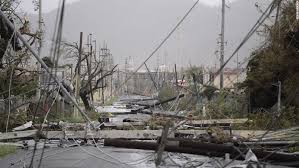
Wasn’t it perhaps foreseeable that the electrical and communications systems would collapse and that dozens of large generators for hospitals and other key points would be necessary, for example for re-establishing communications between physicians? Neither the government of Puerto Rico nor FEMA took into account the hard lesson that reality had taught us. Puerto Rico is an island, different than Louisiana, Texas or Florida, and it needs special plans for a situation like this, not the usual model used in other places.
Those of us on the island immediately realized the inadequacy of the response, but the great majority of us didn’t then have, and still don’t have, many means of protesting. Here the diaspora, Puerto Rico outside of Puerto Rico, had played a key role in criticizing the situation and in demanding that Puerto Rico not be abandoned to fate and that it receive the support of all people as the circumstances demand. Thanks to this, it generated a scandal beyond Puerto Rico and the response improved.
I am not a member of her party and I did not vote for her, but in the same way we have to applaud the protests of the mayor of San Juan. Before she complained he had shown a complete indifference to the Puerto Rican situation.
The response of Trump, both obnoxious and rude, was to be expected. In one of his first tweets he had the indecency to mention the payment of the debt, and now he attacks the Puerto Rican workers who according to him are lazy (something that some people repeat in Puerto Rico, and finding themselves on the side of Trump, perhaps they may pause to reflect.)
But what should be expected of this gentleman? Trump represents political reaction and the negation of all that is good, decent and generous in humanity, including the part of humanity that inhabits the United States. His planned visit, as someone said to me waiting in a line, is a bother; any resource used to take care of that is one resource less for the recovery. His visit will not help the situation nor coordinate the recovery. It’s a photo-op. We have to declare that this racist individual is not welcome in Puerto Rico. The era has now passed when when the governing bodies depend upon his favor and grace, to be gained by the good behavior of the subjects.
Now, thanks to these protests both inside and outside Puerto Rico, more resources for reconstruction have begun to arrive. The greater part of this help, a considerable part, is arriving via the military. We now have a photo of generals directing reconstruction.
On the one hand, we must take advantage of any aid and support that we can in this moment of extreme need. But this too gives us pause for reflection. There are three things to note. First, it is unfortunate that the budget for resources to deal with these situations are in the hands of the military and not of civilian agencies. But this isn’t strange; it is typical of the priorities of most governments, including the United States, in the world in which we live.
Much more is spent, much, much more, on the military apparatus than on education or social well-being. They can maintain an enormous arsenal, but not provide universal health care. This military apparatus isn’t the savior of people affected by disaster; it is an apparatus that normally scoops up an enormous quantity of the resources that should be used for other ends.
The fact that we received support by way of the military doesn’t mean that we have to turn a blind eye to the bitter and dark side of this reality. Nor do we forget it for a second. Redouble our struggle for other priorities in Puerto Rico, in the United States, and in the world.
In the second place, it remains interesting that following the huricane’s strike (and the denunciations and demands mentioned), multi-million dollar resources to attend to Puerto Rico’s reconstructions did appear. But, why now and not before? For some time now we have argued the need for substantial federal assistance for the reconstruction of Puerto Rico (in general and, among other things, in order to transform the energy system). Why was it necessary to wait for a natural-social disaster in order to take measures such as these?
We have to say the same thing about the laws [the restrictions imposed by the Jones Act] of maritime commerce: how many times has it been argued that it was necessary to eliminate them in order to contribute to economic recovery? If eliminating them now helps the recovery, why maintain them in the future?
Ironically, the hurricane resulted in things being done (federal support for reconstruction, suspension of the maritime commerce laws) that for some time many of us have proposed as necessary (although not necessarily in the form they now take). I’ll take up the third reflection on the military aspect later.
Now that Trump himself has raised the issue of the debt in one of his tweets, and now that the president of the Control Committee [over Puerto Rico’s finances, created under the PROMESA Act] has proposed that now many things must be rethought, we have something to say about this. In a few words: anyone who attempted to recover payment of the debt in these circumstance commits a crime against humanity.
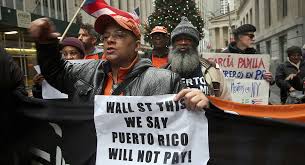
Hurricane María — in addition to destroying housing, workshops, businesses, and infrastructure — destroyed the debt. It is now necessary to revoke PROMESA [Puerto Rico Oversight, Management, and Economic Stability Act – an act of the U.S. Congress] and to annul the debt.
The legal doctrine for this is clear: force majeure, a fundamental change in circumstance and a state of necessity, which I don’t have enough electricity in my computer battery to explain here, but which applies perfectly to the case of Puerto Rico after María (see Eric Toussaint and Demain Millet, Debt, the IMF and the World Bank [New York: Monthly Review, 2010, pages 246-47]). How is it possible to think about collecting this debt, which was unpayable and unsustainable?
Nothing of what is needed will be possible without complaints here and in the diaspora and from our allies outside of Puerto Rico: all the movements for social justice in the United States and in the world. Here, as I said, the hurricane’s strike has led to what is necessary now and in the future: mobilization, denunciation here and outside to demand the means of economic reconstruction, above all the cancellation of the debt and federal support to which we have a right and which Congress owes us (among other things, as corresponds to the situation in a territory over which it maintains colonial control).
The disastrous privatization of our health care system, the inability to undertake seriously a planned economic development according to the necessities of the country, is the other face of this culture with its lack of foresight, whose consequences we are living. If the invisible hand of the market and competition arrange everything efficiently, then why plan? Why look ahead?
This private management, which is also disconnected from the productive apparatus, from an infrastructure that has been for some time now and every day more social and interdependent, in normal conditions generates inequality, corruption and environmental destruction (in the case of Puerto Rico it also generates a one-sided economy, incapable of promoting employment, etc.)
These normal results become, in a crisis, converted into chaos. One has to be struck by the declaration of a telephone company executive: “It is not the time to compete.” Only acting as a collaborative network can we advance. What we really need are social, collaborative responses to our problems, now, and also in the Puerto Rico that we want to reconstruct.
And here I return to the third point that I wanted to make above about the issue of the military role in reconstruction: the other advantage that this apparatus has, which has admirers and even worshipers, is that it is an integrated, planned, coordinated system, in which the parts act (or are supposed to act, I’m not going to idealize) not in competition but rather in collaboration with the others.
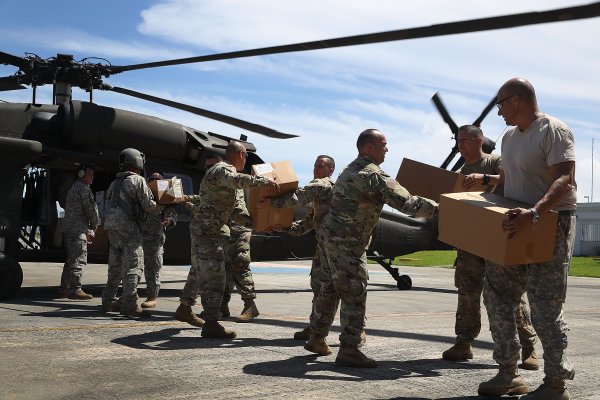
The problem, of course, is that this is a centralized, authoritarian apparatus whose essential ends are destructive (I don’t refer to the intentions of many rank-and-file soldiers, who have become part of the armed forces for a variety of reasons, but to the apparatus).
But the admiration for efficiency of the army is a form of admiration for this functioning that doesn’t obey the sacrosanct laws of the market and of competition. We take the best from this – planning and integrated coordination of resources — and we mix them in the future not with a military and authoritarian management, but with one which is civilian and democratic.
I don’t doubt that the same voices who insisted before María that Puerto Rico couldn’t resolve its own problems, that we had to put them in the hands of the Control Committee so that it could give us the appropriate punishment — I don’t doubt, I repeat, that these voices, will now double down, demanding that we put ourselves in the hands of other federal agencies, including the army, so that they can do for us what we cannot do for ourselves, given that we are incompetent.
There is no point debating with them. They are incorrigible. What we have to do is take from all of this the good and the bad, the lessons for the reconstruction that we want and need.
Now that we are yearning — myself included — for a minimal return to normality, we will not permit that this feeling be manipulated in the future, so that when electricity arrives we think that everything is continuing and will continue as before.
I hear with some anxiety the announcement in the press that experts are coming to bring and share their experience with Katrina in New Orleans. While, of course, we should learn what we can, one has to remember that the Katrina recovery was used to privatize schools, eliminate labor rights, displace communities, and to gentrify (I think the word in Spanish is “aburgesar,” that is, to bourgeoisify) neighborhoods. The use of disasters to push these agendas is typical of what Naomi Klein in her famous book called The Shock Doctrine.
To a certain degree, the proposals made before María remain valid, since María sharpened to a degree the extreme problems that already existed: the need for a plan for economic reconstruction, the need to renegotiate the debt, the need for federal assistance for reconstruction, the need for a democratic reorganization of the government and public services, the need for transportation and public health and renewable energy, the need to revoke PROMESA, the need for mobilization both within and outside of Puerto Rico to achieve all of this.
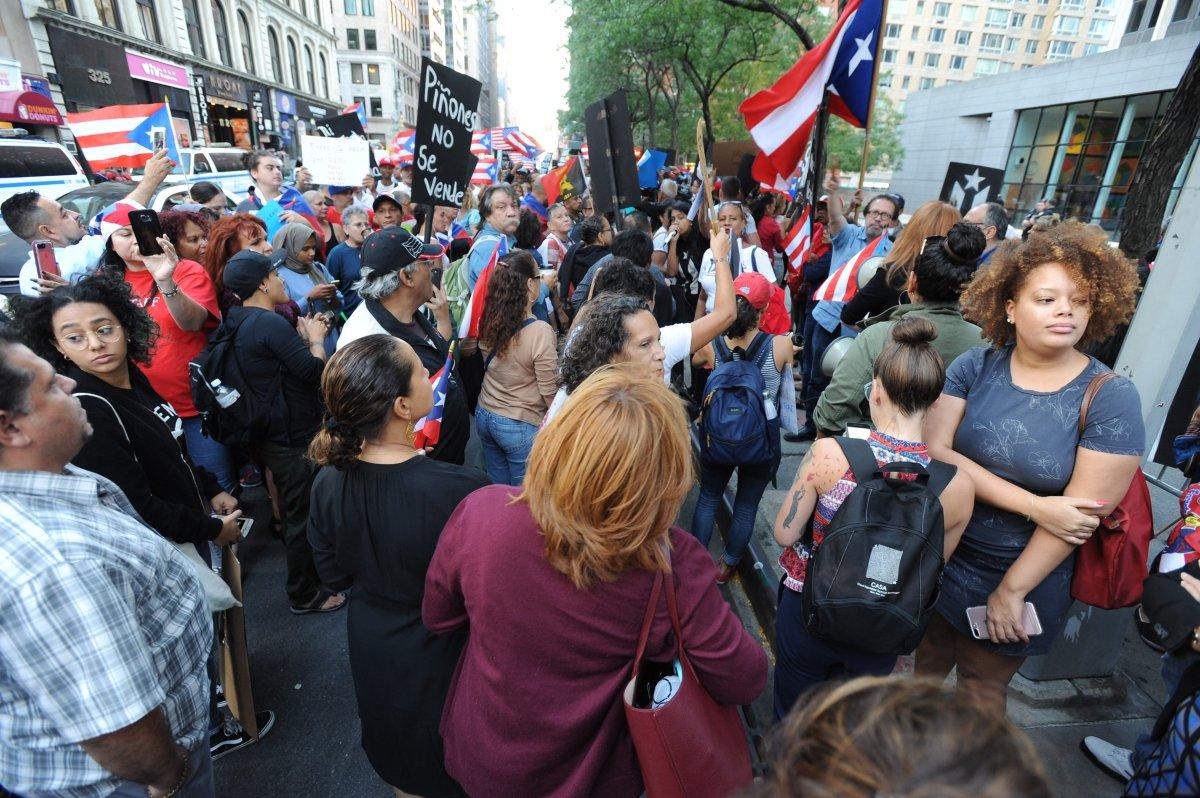
Protestors at Manhattan federal building demand faster relief for Puerto Rico. Photo: NY Daily News Sam Costanza
While it hasn’t been mentioned, I don’t want to leave in the inkwell or on the keyboard the unequal effects of the disaster: those who are worse off are those who had less before María. Reconstruction should be a reconstruction that leads to greater equality.
It’s important to note that economic reconstruction will be the greatest need. A question in the near future will be the reaction of the great corporations that generate huge profits in Puerto Rico (and pay few taxes) after the hurricane. Will they continue operating here? I think that at least some of them will perhaps decide to leave.
In a private economy, as we know, these decisions that affect the whole community or country are taken without regard to anything but the profits of the companies involved. Once again, if Puerto Rico already needed a new economy, the hurricane’s blow has only accentuated the situation.
The situation in Puerto Rico today reminds us of the beginning of the decade of the 1930s: battered by terrible hurricanes (San Felipe and San Ciprián) and engulfed by an economic depression. We got out of that crisis thanks to great movements for social justice that proposed agrarian reform, the creation of public services, labor rights, economic reconstruction, and national self-determination, and which also searched for allies outside of Puerto Rico.
The leader of the greatest of these movements, the Popular Democratic Party, later abandoned all that it had defended. We are constructing today the equivalent of those movements and those alliances. We have the steadfastness that others lacked to remain true to the program that the country needs. This steadfastness can only arise from the working people organized in defense of their interests.
This organization is today weak, fragmented, and battered: reconstructing it is the fundamental task for the reconstruction that we need. We hope that the hurricane may also have swept away the obstacles of division, sectarianism and personal ambitions that have held us back. My greatest desire is for the safety, security and recovery of all the men and women across the length and breadth of Puerto Rico.
Rafael Bernabe was the Working Peoples Party (PPT) candidate for governor of Puerto Rico in the 2016 elections. He is the co-author with César Ayala of Puerto Rico in the American Century: A History since 1898(Chapel Hill: University of North Carolina, 2017).
Thanks to Dan La Botz for translation.
